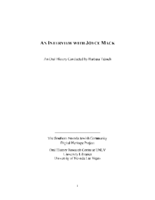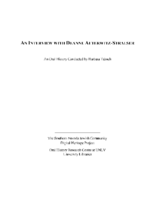Search the Special Collections and Archives Portal
Search Results

Transcript of interview with Santo Savino by Lisa Gioia-Acres, September 23, 2008
Date
Archival Collection
Description
Santo was born in the Bronx, New York in 1937. Santo’s family includes his father who was a butcher, and his mother who mostly stayed at home to raise the children, as well as a brother who currently lives with Santo. Santo recalls that it was great growing up in the Bronx, and he spent most of his life there until he joined the Air Force when he was 17. Santo’s immediate family was not musically oriented, but he learned to play the drums from a cousin. Music came easy for Santo, and he started getting paid for playing when he was 12. At 17, Santo joined the Air Force with a group of friends. He auditioned for and was accepted into the Air Force band where he played drums for four years. Santo was married with a child and another child on the way when he ended his military career and moved to California. After jobs working as a security guard and on an assembly line, Santo knew he just wanted to play and came to Las Vegas in 1960 to play with a band. It took several years before Santo was able to get on with a permanent band. Once Santo broke into the scene in Las Vegas, he played for six years at the Flamingo. Following that he was on the road for a couple of years with Paul Anka. Upon returning to Las Vegas, Santo worked for 14 years at the Sahara. Santo talks about when “the boys” had the hotels before the corporations came in and how everything changed. Currently, Santo does a lot of work with trumpet player Carl Saunders, frequently traveling to Los Angeles to do recordings together.
Text

Transcript of interview with Mahamed Youssouf by Barbara Tabach, August 6, 2013 & August 13, 2013
Date
Archival Collection
Description
Ethiopian business owner Mahamed Youssouf became an American citizen in 1986. Born in Harar, Ethiopia, he recalls the hardships he had to endure during the Ethiopia-Somalia conflict. Coming from a family of tailors, he began making clothes with his father at a very early age. Mahamed’s recollections concerning his journey from political refugee to successful businessman demonstrates his resilience and determination to overcome obstacles and achieve his goals. Mahamed moved to Las Vegas, Nevada in 1985, where he rented a storefront in North Las Vegas. The name of his store was Uniform Plus and he focused mainly on making children’s clothes. His efforts proved lucrative as he began buying wholesale in Los Angeles, California, and selling clothes in Las Vegas on the weekends at the outdoor Swap Meet. After a fateful encounter, Mahamed became business partners with Eugene Hoffman, owner of Village East Cleaners. Mahamed firmly believes that communication is the key to socio-economic success. He views education as an investment and states that, “to have dialogue means better relationships.” When the Ethiopian government was overthrown, Mahamed returned home to Africa for a visit. He met his wife while there, got married, and started a family. Mahamed returned to America and bought a family home in Las Vegas. He dedicated his time to teaching his American born children more about Ethiopian culture and taught himself more about American culture— including the African-American experience in Las Vegas, racism, the Moulin Rouge, and the Westside.
Text

Transcript of interview with Sarah & Joni Fried by Barbara Tabach, March 4, 2016
Date
Archival Collection
Description
The website for Freed’s Bakery happily displays the headline: Baking Sweet Memories Since 1959. Today the third generation of Frieds (correct spelling of the family surname) is hard at work creating incredible wedding cakes, cookies, and delightful desserts for the Las Vegas valley. For this oral history interview, Joni Fried, her daughter Sarah Fried, and nephew Max Jacobson-Fried sit to share stories of working in the family business started by Joni’s parents Milton and Esther Fried. Joni has handed the reins over to the third generation who invest their delicious souls into maintaining this Las Vegas tradition. Their tales range from childhood memories of holidays baking and cleaning to their personal favorite desserts. They also explain the impact on their business as early adapters of computer technologies and social media marketing. In October 2017, Freed’s Bakery landed a TV show, Vegas Cakes, on the Food Network.
Text

Moises Denis interview, January 11, 2019: transcript
Date
Archival Collection
Description
Interviewed by Marcela Rodriguez-Campo. Laurents Bañuelos-Benites, Maribel Calderón, and Barbara Tabach also participate in the questioning. Moises "Mo" Denis is a Cuban American born in Brooklyn, New York. He served as the first Latino Majority Leader in the Nevada State Senate and has been involved in public service for over 30 years. As a leader in the Church of Latter Day Saints and his involvement with supporting Latinx initiatives, Mo has been able to increase the representation of Latinos in politics and support educational reform. While early on his family moved around a lot, they finally settled in Las Vegas and have continued to grow their family. Mo is a Rancho High School alum and went on to graduate from Brigham Young University as a music major. He first started his career by opening a music store, but later began working in the tech industry. Eventually, through his involvement in the PTA, Mo was appointed to serve on the Clark County Library Board. There he was involve
Text

Transcript of interview with Stella Iaconis by Gary Gione, February 26, 1976
Date
Archival Collection
Description
On February 26, 1976, Gary Gione interviewed Stella Iaconis (born September 16th, 1910 in Italy) about her life in Southern Nevada. The two discuss Iaconis’ reasons for moving to Las Vegas as well as her childhood memories of Hooverville. Iaconis also talks about seeing the above-ground atomic tests in Southern Nevada from Los Angeles, and the drastic population growth that occurred after the construction of Hoover Dam.
Text

Transcript of interview with Kenny Kerr by Dennis McBride, May 29 & 30, 2001
Date
Archival Collection
Description
In the years following this interview, Kerr continued entertaining, although he never returned to the Las Vegas Strip. Kerr performed at OUTfest Phoenix, at Palm Springs’ Awesome August celebrations, Las Vegas’ National Coming Out Day event, and for the Gay and Lesbian Community Center’s Youth Service’s Division. Kerr also gave shows at small bars and restaurants such as Café Nicolle and DeStefano’s in Las Vegas, the Wilde Goose in Cathedral City, California, and the Plush Room in San Francisco. There were rumors that Kerr was set to replace emcee Joey Arias in Cirque du Soliel [2004] and Frank Marino in La Cage [2005], but neither turned out to be true. Instead, Kerr performed in such local gay nightclubs as Flex, Sasha’s, Krave, Suede, and, on July 31, 2012, at the Onyx Theatre in Commercial Center. In 2006, Kerr made peace with his former rival, Frank Marino. Kerr’s son, Kristin Vidal, made Kenny a grandfather with his own son, Alexander. It was clear during his July 2012 performan
Text

Theresa Thomas interview, March 13, 1995: transcript
Date
Archival Collection
Description
Thomas discusses her early life in Thistle, Utah before moving to Las Vegas, Nevada in approximately 1931, where her father worked on the Hoover Dam (Boulder Dam) construction. Thomas then talks about her early schooling in Boulder City, Nevada, her experiences as a swing and dance band musician, Block 16 in the Clark Las Vegas Townsite, and her memories of Las Vegas hotels and casinos. Other subjects Thomas covers include Las Vegas entertainers, entertainment venues, and women in the music industry during the 1930s.
Text

Transcript of interview with Mindy Unger-Wadkins by Barbara Tabach, October 28, 2015
Date
Archival Collection
Description
In this interview, Unger-Wadkins discusses growing up in Las Vegas? close-knit Jewish community in the 1960s and 1970s, and involvement with various Jewish youth organizations and activities. She also describes her career in public relations, reflecting upon the unique challenges faced when interacting with the public, and with politics, in her positions. Unger-Wadkins ends by describing her current work in land development, particularly the history of the Three Kids Mine and the technical and political process of ensuring the land is suitable as a residential area.
Text

Transcript of interview with Joyce Mack by Barbara Tabach, February 23, 2015
Date
Archival Collection
Description
In this interview, Joyce Mack discusses meeting her husband, Jerry Mack, in Los Angeles,their early life as a couple, and moving to Las Vegas at the suggestion of Jerry's father, Nate Mack. She discusses how Jerry met Parry Thomas and their banking and real estate investments. Mrs. Mack talks about the opening of the Thomas and Mack Center at UNLV, and the development of the strip hotels, and discusses her children.
Joyce Mack: wife to Jerry Mack and matriarch of one of the most influential families of Las Vegas history. During this oral history conversation, she begins by tracing her family ancestry from Kiev to New York to Omaha and then Los Angeles, where she was born and raised. At a UCLA fraternity party in the early 1940s, a teenage Joyce Rosenberg was swept off her feet by her older brother's friend Jerry Mack. Jerry was from Boulder City, Nevada and had attended school in Las Vegas. In 1946, the couple married and took an extended honeymoon throughout the United States and Cuba. Soon afterwards, Jerry's father Nate Mack, a businessman and real estate developer encouraged the newlyweds to come to Las Vegas. She tells of Jerry sharing his vision of the valley's future. Thus began a successful journey that traverses decades of Las Vegas history and breathtaking growth in which the Macks were active participants and leaders. Joyce recalls the people the first met, who they raised their children side-by-side with and became lasting friends. These people were other Las Vegas pioneers including the Greenspuns and mostly importantly her husband's partnership with Parry Thomas which created the Bank of Las Vegas. It was their partnership she explains that reduced the presence of the mob element. As members of the small Jewish community of the late 1940s, the Macks would participate in the founding of Temple Beth Sholom.
Text

Transcript of interview with Deanne Alterwitz-Stralser by Barbara Tabach, November 1, 2014
Date
Archival Collection
Description
Interview with Deanne Alterwitz-Stralser with contributions from her son Daryl Alterwitz on November 1, 2014. In this interview Deanne talks about her Jewish upbringing near the Illinois-Indiana state line, meeting her first husband Oscar, with whom she had four children, and the difficulties with keeping kosher. The family moved to Las Vegas from Gary, Indiana for opportunities in the furniture business. Daryl weighs in on his father's personality, business decisions, and their move to Las Vegas. They discuss the location of the store the Alterwitz's bought (Walker Furniture) and purchasing the building from Jackie Gaughan, and the different tastes in furniture in Las Vegas. Then they talk about the Jewish community and the division between the east and west sides.
On New Year's Day, 1931, Deanne Alterwitz-Stralser was born Deanne Friedman in Hammond, Indiana, the daughter of an insurance salesman and a stay-at-home mom. Deanne spent her childhood in Calumet City, just across the state line in Illinois, and was raised with a strong Jewish identity. At the age of sixteen, she met her first husband, Oscar Alterwitz, at an Alpha Zadik Alpha (AZA) dance in Gary, Indiana, and the two were married in 1950. Deanne and Oscar settled in Gary, where they had four children?Aimee, Larry, Daryl and Linda?and took over the Alterwitz family furniture business. Eventually, the couple grew the business to three successful retail furniture stores. However, a decline in the city's safety and opportunities forced the Alterwitz's to consider relocating, and in 1973, after a family vote, Deanne and Oscar moved their family to Las Vegas. Upon arrival, Deanne and Oscar bought Walker Furniture from original owners, George and Ruth Walker. Deanne used her artistic eye and training from the Art Institute of Chicago to lead the design and merchandising elements of the business. Socially, Deanne integrated into the local Jewish community, and ensured her children participated in Jewish life as well. Deanne and Oscar's children still remained involved in Walker Furniture operations, including Daryl, who serves as the company's general counsel; Larry, who is the company's president; and a daughter who now oversees the store's design and merchandising.
Text
